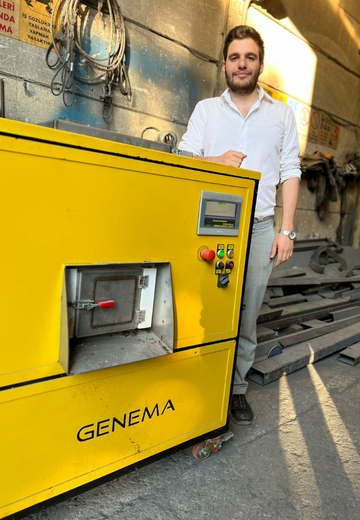Zero Waste Composting Machine

Zero waste composting machine is a small-scale composting machine that complies with the zero waste regulations. Small scale composting machines offer numerous benefits for those looking to efficiently and conveniently compost their organic waste. These machines are easy to use and maintain, and can be used indoors or outdoors. In addition, they can process organic waste much faster than traditional methods, often producing compost within a few weeks.
Small scale composting machines also operate odorlessly, making them suitable for use in urban areas or small spaces. By composting organic waste, you can significantly reduce the amount of waste sent to landfills, which helps to reduce greenhouse gas emissions and conserve natural resources. The nutrient-rich compost produced by these machines can be used to enrich soil and improve plant growth.
Additionally, small scale composting machines can save you money in the long run by reducing the need to purchase expensive fertilizers or soil amendments. Overall, small scale composting machines offer a convenient and effective way to compost organic waste.
Zero Waste Composting Machine
These are the machines in which organic wastes are converted into value-added organic fertilizers in a short time. The aforementioned ‘zero waste’ emphasis refers to compliance with the zero waste project and regulation.
Corporate companies can convert food waste and other organic waste into organic fertilizers in an odorless way with a compost machine and use them in their landscaping. Since compost produced from waste is essentially a soil conditioner, its excessive use, as in chemical fertilizers, does not have a negative effect on the soil.
Compostable Waste
A zero waste composting machine can recycle a variety of organic waste materials. These include food scraps, yard waste, paper products, and even certain types of plastics. By using a zero waste composting machine, you can divert these materials from landfills and instead turn them into nutrient-rich compost for your garden. In addition to reducing waste and conserving natural resources, composting with a zero waste machine can also save you money by reducing the need to purchase expensive fertilizers or soil amendments.
*If crusty wastes or bones are also desired to be recycled, a shredder type machine should be preferred.
Non-Compostable Waste
There are certain types of waste that you should not compost in a zero waste composting machine. These include meat, bones, and dairy products, as they can attract pests and produce unpleasant odors. You should also avoid composting diseased or insect-infested plants, as this can spread diseases or pests to other plants.You should not compost chemical products, such as pesticides or fertilizers, as they can contaminate the compost and make it harmful to plants. Synthetic materials, like plastics and rubber, do not break down easily and should not be composted, as they can take years to decompose in a compost pile. You should also avoid composting non-organic materials, such as metal and glass, as they do not break down. To ensure that you are producing high-quality compost that is safe and effective for use in your garden, you should follow the guidelines of your small scale composter and only compost materials that are suitable for composting.
Decision Mechanism For Buying a Compost Machine
-
Education
When buying a compost machine, you should consider the compatibility between the scientific parameters called “composting parameters” and the machine functions. Claims such as “compost in 24 hours” or “compost in 16 hours” are purely sales strategies. The personnel who will be using the compost machine in the enterprise that purchases it should have some knowledge about the scientific process of composting. This is because it is only through a proper understanding of the process that the product will be able to benefit the soil. Improper composting can cause phytotoxic effects and negatively affect plant growth. Therefore, the manufacturer should also provide training on the correct use of the machine.
-
Material
During the composting process, the areas that come into contact with the material are likely to erode over time. One factor that determines the longevity of the compost machine is the choice of material used in its production. Choosing the appropriate type of stainless steel in appropriate thicknesses can significantly increase the economic life of the machine.
-
Odor Removal
Since zero waste composting machines are often preferred in municipalities, plazas, and business centers, it is important to ensure that they do not spread bad odors during the composting process. To do this, you should determine whether the compost machine has an effective odor removal system.
-
Security
When you open the machine cover, the shaft movement should automatically stop. In addition, if other components on the machine fail, the detailed description of the error should be displayed on the screen. The machine should store process data for a certain period of time and allow you to access it at any time. The machine’s design should be compact and suitable for fast service.
-
Experience
If the manufacturer has many years of experience in the sector and has conducted R&D activities in this field, it can help your institution to develop long-term innovative projects. It will be useful to understand the manufacturer’s expertise in the field by reviewing their other productions and activities.
GENEMA-GKB50 Compost Machine
It is the smallest compost machine model of GENEMA and has a useful usage volume of 50 liters. There are options with or without shredder in accordance with the intended use.
| Brand | GENEMA |
| Modal | GKB50 |
| Capacity | 50 Liter Waste/Day |
| Material | Stainless Steel |
| Electricity | 380 V/ 3 Phase |
| Power Consumption | 2 kW/Day |
| Weight | 280 kg |
| Shredding | Optional |
| Aeration | Available |
| Odor Removal | Available |
| Circulation System | Optional |
| Screen | Available |
| Dimensions | 1200*1000*1150 |
| Operation | Fully Automatic |
Compliance With Zero Waste Regulations
Zero waste regulations minimize waste production and promote sustainable practices. These regulations can include recycling requirements, waste bans, and incentives for businesses and individuals to reduce waste.
One of the main goals of zero waste regulations is to reduce the amount of waste sent to landfills. Landfills are a major source of greenhouse gas emissions, as the decomposition of organic waste releases methane, a potent greenhouse gas. By reducing the amount of waste sent to landfills, we can help to reduce greenhouse gas emissions and mitigate the negative impacts of climate change.
In addition to reducing greenhouse gas emissions, zero waste regulations can also conserve natural resources and reduce pollution. For example, recycling programs can save energy and reduce the need to extract and process raw materials.
Businesses and individuals can play a crucial role in helping to meet zero waste goals by reducing their waste and adopting sustainable practices. This can include recycling, composting, and reducing consumption of single-use items. By working together, we can create a more sustainable future and reduce our impact on the environment.
Composting Parameters: Key parameters of composting systems
GENEMA-GKB50-Composting Machine – Gübre Pazarı (gubrepazari.com)
You can call for detailed information and offers:
Ahmet KITIR/Chemical Engineer
(+905469304429)

